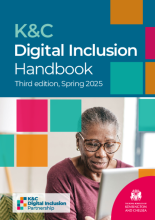K&C Digital Inclusion Partnership
During the pandemic, the council and our colleagues in the local NHS, third sector, and more, established the K&C Digital Inclusion Partnership. We are working with many local community groups and regional organisations, coordinating our efforts so more support is available for our residents to get online and be able to confidently use the internet.
Benefits of being online
Anyone not able to use the internet is 'digitally excluded'. This includes not knowing how to do things online and not having access to an appropriate device or an internet connection.
Being online helps people:
- connect with friends and family
- find out information and pursue interests
- as well as access services
Being online helps us save money as services and products can be cheaper online. We do not believe anyone should be forced to use online service, but we want to make sure no one feels 'left behind' or that digital tools 'aren’t for them'.
Help to get online
Find how you can get help getting online in our Digital Inclusion Handbook or by checking our digital support drop-in support map:

